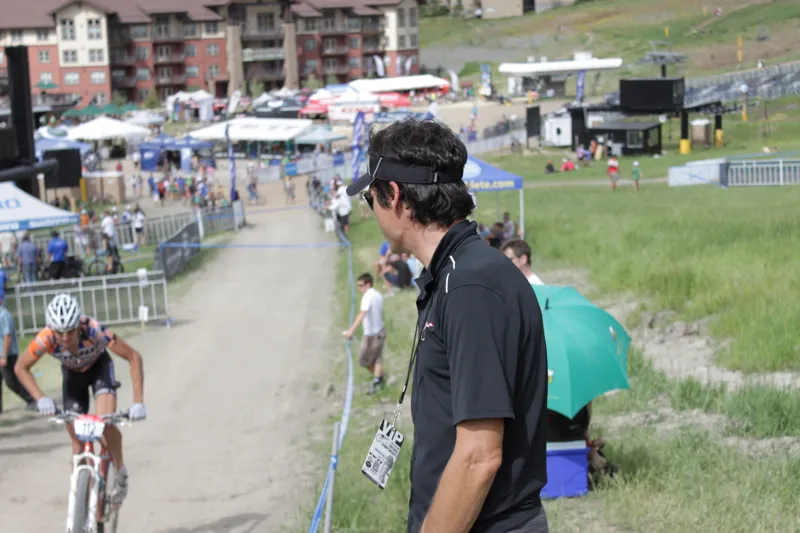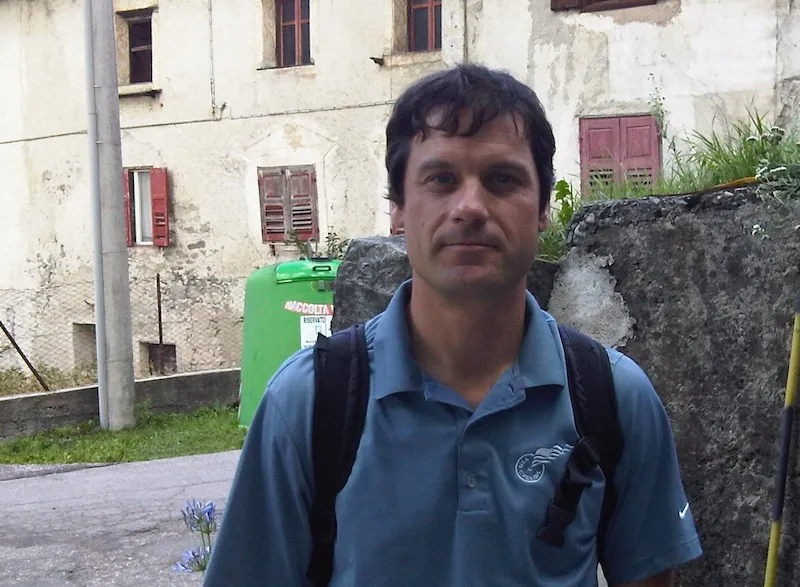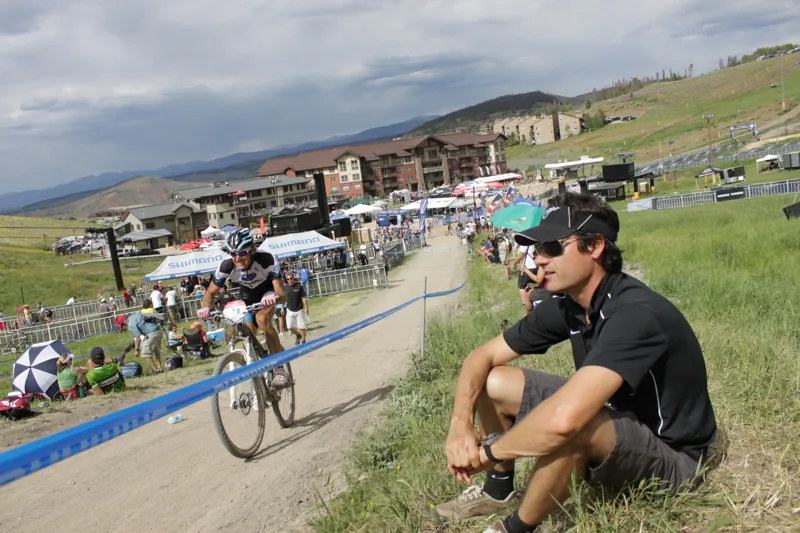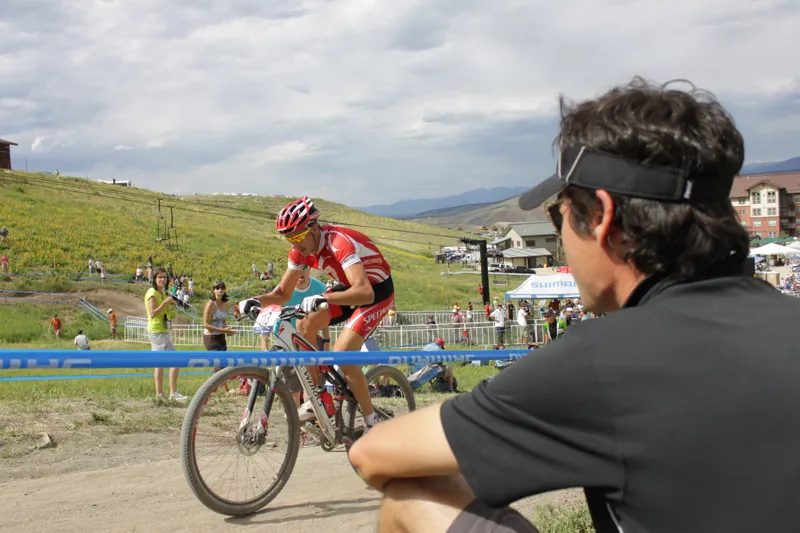In November of 2004, three months before Marc Gullickson would retire from his own 15-year-long professional cycling career, he told then Cyclingnews reporter Steve Medcroft what he aspired to, post racing.
"I hope to be the national coach for the junior world's team."
Fast forward six years and you'll find Gullickson at the head of USA Cycling's development programs for mountain bike and cyclo-cross as their mountain bike and cyclo-cross program manager.
Though it doesn't have anything to do with pushing on pedals — he has plenty of other gritty experiences to back up that part of the job — the example he sets of stating a goal and achieving it, is one he hopes to pass onto the young hopefuls of the sport.
As a racer, Gullickson has done it all, road, mountain and, what he's best known for, cyclo-cross; he was the US National Champion in 1999, but best known for his epic solo battles with the powerful multi-man Saturn cyclo-cross team of the late '90s.
He started off as a cross-country ski racer and found cycling as a way of staying fit through the summer. He quickly made cycling his full time profession. Throughout his career he raced for historic teams including Volvo-Cannondale and Team GT.
Now, Gully, as he's affectionately called by those who know him, splits his time between USA Cycling's Colorado Springs, Colorado headquarters and his mountain bike development program's base in Kirchzarten, Germany where he runs USA Cycling's European Race Camps.
BikeRadar caught up with Gullickson at the Sol Vista ski resort in Granby, Colorado where he was watching his racers and scouting for new talent at the 2010 US National Mountain bike championships. We spoke about recruiting young mountain bike talent and how USA Cycling works to help them reach their potential.
BikeRadar: How does someone show up on your radar? Is it the racer winning every weekend or do you look for something else?
Gullickson: The winner of all of the world championship qualification races by discipline and age category are automatics, so I'm looking past first place. This is an important qualification race, but this is also as opposite as you can get from [Mont] Sainte Anne where the worlds are. And that goes for downhill and cross-country. Sainte Anne is super technical with short climbs that require power, but having said that this is the nationals and everyone knew that coming in; this is a big race.
So I'm looking down, second, third and fourth in each discipline for each different situation in some cases a third or fourth will get you on the team in others it won't, it's a combination of what they've done the rest of the year too.
How many events during the season are you on the ground scouting?
I call out specific events in the selection document; it's quite extensive because there are so many categories at the worlds for mountain bike. In addition to this race, for example, for junior cross-country men and women we used Sea Otter and Wisconsin as qualification events. They weren't outright qualification events, but if the winner was top 5 or top 3 here [at nationals] that was an automatic.
World Cups are always on the top of the list for races I look at, from elite all the way down to juniors. Not that many juniors ever go to World Cup races, but I put that in there to let them know that I want to see them at big races. Plus, I take five good juniors over to Europe in the spring.
So that's a good segue into what you're doing to give America's younger racers experience racing in Europe. Can you tell us about USA Cycling's European mountain bike program?
We run a mountain bike development race camp over in Germany. I started with six under 23 guys this year, which USA Cycling fully funded, and those are the guys that I determined at the beginning of the year to show the most potential. They go over for four weeks and four big races, a couple of world cups and a couple of Swiss cups.
Then I flip it and bring another group of younger under 23 guys for just two weeks and take a look at those guys in a couple Swiss cup races and then a group of junior men and finally some under 25 women and some more under 23 men.
It ends up being four different groups of six riders, basically. The later groups are partially funded by USA cycling, they're not fully funded, but I do pick up a good portion of what the cost would be if they wanted to do that on their own.
How do the racers get picked for the program?
The first group, the fully funded group, I've hand picked myself. I've contacted them and asked them to participate; we're in pretty good contact [overall]. The partially funded camps are petition based. I have a petition and information form on the mountain bike page of our website. Riders can petition for those camps and I basically choose the strongest riders based, generally, on the previous season's results or very early season results.
If they participate in a program does that give them a better chance to race the world championships?
When those juniors are over there the guys winning the junior races are the same juniors who are going to win worlds. So for me it's a really good look at what they can do.
I get a lot of good information by watching those guys race in Europe. And for me that's more important than this national championship, in a lot of ways and because, without question, it's more similar to what worlds will be like. It's a big push for USA Cycling's development program.
Where do you go from here since all of the national level racing pretty much wraps up with nationals?
So the next two weekends I'm going to the two World Cups in Switzerland and Italy. After the spring camps I kind of reshuffled the cards and I bring the U23 riders that I feel stepped up the most and then some younger guys that caught my eye. So it's a different group than the first.
What's it like once you get over there? What's the day to day?
We have a really nice place in Kirchzarten, Germany that we base out of. They're apartments on a working farm. It's a huge farmhouse with a bunch of really nice apartments and we put three or four guys in each apartment.
They do their own breakfast and lunch in the apartment and we do a catered dinner every night. We try to get them out together, generally, for training, although especially with the later groups that are only there for two weeks, I don't try to totally change their training, because they already know what they need to do for the races, but we try to give them good advice, especially if we see them doing something that isn't right.
When I say ‘we,' I'm there for the first group then Matt Shriver [the cycling coach at Fort Lewis College in Durango, Colorado] comes in and helps me with some of the later groups. We can almost always drive to the races and back in the same day, so that's really convenient.

Gully has a good eye for talent
So where is the potential of the riders in the current program?
It's good. [Rob] Squire and Tad Elliot went two and one [respectively] yesterday. Squire is super talented, he's a second year under 23, but he's also on Vaughters' under 23 road team [Felt-Holowesko Partners] and he's pretty enamoured by the road and I see him probably spending a lot more time on the road. Hopefully he'll do some mountain bike racing, but I don't think he's going to be within my development program any more because I think he's going to try to throw his cards down on the road side and in the end he has to find his own path.
With the depressed state of professional mountain bike racing in this country, what are you selling to these kids? What are realistic aspirations for them to have?
That's the thing and Squire is a good example, there's a lot more opportunity on the road for the under 23 guys and to stay on the mountain bike when you have that much natural ability is ... you can view it as not the most lucrative career choice.
Having said that, not all of these guys are into racing on the road, a lot of them love to race mountain bikes, which is great and we're not going to find that all of our best guys go to the road.
I definitely went to bat for a few of our best guys, this year, to get them on domestic teams — Tad with ShoAir-Specialized and Ethan [Gilmore] got on Giant and Rob with Jamis — I'm not saying I'm the one who got them on, but I definitely sort of spearheaded some of that discussion.
They're not making money or anything, but they're getting some support, which is really the best you can hope for in this climate. But, if they're riding well and they're in Europe, I've got all of their expenses, which is significant support and if they're riding really well and they want to spend more time in Europe, they can. If they can find domestic support, which I think if they're decent riders they should get some then they can spend half the year in Europe with me and I think that's the best development they can have.
Are you doing things differently from previous USA Cycling development programs? Back in the late '90s and early 2000s there was a crop of talented young American juniors that excelled in international competition only to quit cycling after a season or two as seniors.
Give me an example.
Jess Swiggers, Matt Kelly, Walker Ferguson, Cecilia Potts, Pat Bowers…
I think what flipped the switch for those guys is that they were brought into a national team program — I wasn't part of USA Cycling then, so this is from the outside looking in — but it seemed like they got really fast really quickly and then flamed out. I think that, maybe, they were pushed a little too much into training that may have been too much for them, I don't know.
I think that we could go a little more in that direction now and find a balance where we can get them to a level that maybe isn't quite as high as those guys were, but we can get them to a place where they can be noticed by teams and start breaking into the pro scene more, [of course] without burning them out.
It's a balance. I don't know why those guys stopped racing, they were all really good. I'm not sure what happened. I think about that a lot and I look at certain pieces of that program that I like. At one point most of those guys were all national team guys and that's sort of what we look like in Europe.
We look like a good, well-run national team. So I like the way those guys rode together and got fast together, but now we need to complete the circle and keep them in the sport. That's the million-dollar question — how do we do that?
It doesn't sound like you have an answer yet?
Not yet, but I don't think there's one answer to it. I think it's a lot of different things and I think we're getting close.


